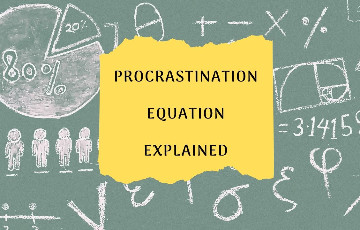
Dr. Piers Steel planned the Procrastination Equation. He built the equation based on 4 important variables and 5 Important Criteria that affect your motivation and procrastination.
Procrastination Equation is:
MOTIVATION = EXPECTANCY * VALUE / IMPULSIVENESS * DELAY
The four important variables:
Expectancy: It refers to how much you expect to succeed in a particular task? What is expected out of a task? What is your expectation? Etc. If expectations are high, we procrastinate less when compared to tasks and activities having a low expectancy.
Value: Value refers to meaning, benefits, purpose, feeling content, gaining moral-boost, improving self-confidence. Tasks that hold high value and adds meaning to you will bring motivation. It stops you from procrastinating.
Impulsiveness: Easily getting distracted, unable to stay focused, looking for instant-gratification are all a few examples of serious impulsiveness leading to procrastination.
Delay: If there are lengthy delays with a task, you will eventually start procrastinating.
The 5 important criteria:
- If you want to overcome procrastination, you need to increase the “Expectancy” and “Value” of a task. If your expectation about a task is high and optimistic, and if you find it worthwhile, you are more likely to finish the task. You will stay motivated. The chance of procrastinating will be minimal.
- If your task has a good “value” to it, it is enough to stay motivated. There will be no procrastination when what you do gives you meaning and value.
- Decrease the “Impulsiveness” and “Delay” habits to overcome procrastination.
- Tasks with “Less Value” and “High Expectancy” increase procrastination chances.
- More Impulsiveness and More Delay decrease your motivation leading to procrastination.
Procrastination Equation gives a clear picture of identifying what causes procrastination. It is highly useful for people who can’t figure out why they are procrastinating.


